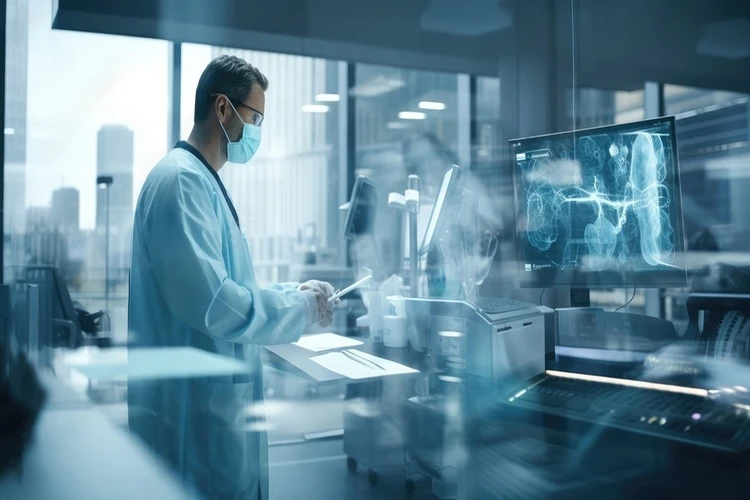The Connected Care: Harnessing the Power of IoT in Healthcare
Category: Smart Healthcare Technologies
In the ever-evolving landscape of healthcare, the integration of the Internet of Things (IoT) has ushered in a new era of connected and data-driven patient care. IoT, with its network of interconnected devices and sensors, is transforming how healthcare is delivered and experienced. This article explores the multifaceted impact of IoT in healthcare, examining how it enhances patient monitoring, streamlines healthcare operations, and contributes to the vision of a more efficient and patient-centric healthcare ecosystem.
1. Smart Patient Monitoring: Revolutionizing Real-Time Healthcare
- IoT is revolutionizing patient monitoring by introducing smart devices that continuously collect and transmit vital health data. This section explores how IoT-enabled wearables, such as smartwatches and fitness trackers, facilitate real-time monitoring of vital signs, enabling healthcare providers to access comprehensive patient data remotely and in real-time.
2. Enhanced Diagnostics through IoT: From Imaging to Data-Driven Insights
- In the realm of diagnostics, IoT is playing a pivotal role in enhancing accuracy and efficiency. This heading delves into how IoT is integrated into diagnostic imaging equipment, allowing for seamless data transfer and analysis. From connected MRI machines to smart X-ray devices, IoT is contributing to more precise diagnostics and data-driven insights for healthcare professionals.
3. Medication Adherence and IoT: Smart Solutions for Better Outcomes
- IoT is addressing medication adherence challenges through smart solutions. This section explores how IoT-enabled devices, such as smart pill dispensers and medication tracking apps, help patients adhere to prescribed regimens. These devices provide reminders, track medication consumption, and share data with healthcare providers, fostering improved medication management and patient outcomes.
4. IoT in Hospital Operations: Optimizing Efficiency and Patient Experience
- Beyond patient care, IoT is optimizing hospital operations for enhanced efficiency and patient experiences. This heading delves into how IoT is utilized for asset tracking, inventory management, and even smart infrastructure for hospitals. By connecting various components within a healthcare facility, IoT contributes to streamlined workflows, reduced operational costs, and an overall improvement in patient services.
5. Security and Privacy Considerations: Safeguarding Patient Data in the IoT Era
- While IoT brings immense benefits, it also raises concerns about security and privacy in healthcare. This section explores the critical importance of securing IoT devices and networks to safeguard patient data. From encryption methods to stringent access controls, implementing robust security measures is essential to ensure the trustworthiness of IoT applications in healthcare.
CASE STUDIES
Case Study 1: Philips Healthcare - IoT in Remote Patient Monitoring
Overview:
- Philips Healthcare has been a trailblazer in implementing IoT for remote patient monitoring, enhancing the management of chronic diseases and promoting preventive care.
Implementation:
- Philips leverages IoT-enabled devices, including wearables and smart sensors, to continuously collect and transmit patient data. These devices monitor vital signs, track medication adherence, and provide real-time health insights. The collected data is securely transmitted to healthcare providers through a connected platform, enabling proactive interventions and personalized healthcare management.
Results:
- The implementation of IoT in remote patient monitoring by Philips has demonstrated positive outcomes. Patients experience improved health outcomes, reduced hospitalizations, and better management of chronic conditions. Healthcare providers benefit from real-time access to comprehensive patient data, enabling more informed decision-making and personalized care plans. The case study showcases the potential of IoT to revolutionize patient care, especially in the context of chronic disease management.
Case Study 2: Cleveland Clinic - IoT for Hospital Operations Optimization
Overview:
- Cleveland Clinic, a renowned healthcare institution, has embraced IoT to optimize hospital operations, streamline workflows, and enhance the overall patient experience.
Implementation:
- Cleveland Clinic has integrated IoT for various operational aspects, including asset tracking, inventory management, and smart building infrastructure. IoT sensors are deployed to monitor the location and status of medical equipment, manage inventory levels efficiently, and ensure the smooth functioning of hospital facilities. This interconnected system contributes to operational efficiency and a seamless patient experience.
Results:
- The adoption of IoT in hospital operations at Cleveland Clinic has resulted in improved efficiency and resource utilization. Through real-time monitoring and data-driven insights, the hospital can track the availability and condition of critical assets, reduce unnecessary costs, and enhance the overall patient experience. This case study illustrates how IoT applications can transform not only patient care but also the operational backbone of healthcare institutions.

